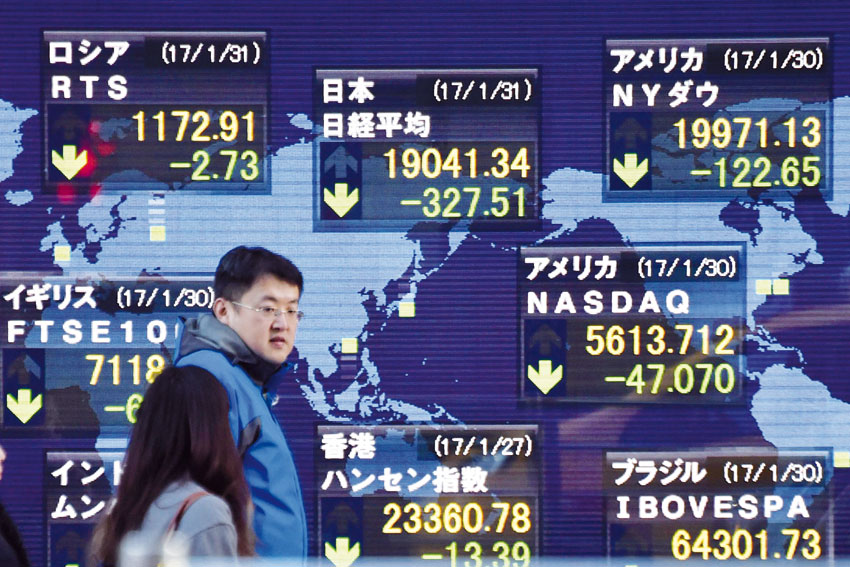

HONG KONG: Chinese stocks slumped on Friday, sending Asian markets skidding for their biggest losses in two weeks after Beijing unexpectedly raised short-term interest rates, adding to growing concerns about US President Donald Trump’s aggressive policies.
European stocks are expected to take Asia’s lead with major bourses set to open in the red before a key US jobs report sheds further light on the outlook for US monetary policy in the coming months.
On the first day of trading after a week-long break for the Lunar New Year, Chinese equities tumbled and the currency weakened after the People’s Bank of China raised the interest rates on open market operations by 10 basis points.
Two banking sources also said it had raised the lending rates on its standing lending facility (SLF) short-term loans, suggesting policymakers were tugging multiple levers to slow down a rampant build-up in debt among Chinese corporates.
Chinese yields snapped a three-year declining trend in late October with five-year benchmark yields rising by 65 basis points since then. Ten year yields have surged by a greater magnitude. They extended their rise on Friday.
TRUMP TRADE TOP: The China news couldn’t have come at a worse time for risky assets just as a rally in US equities and the dollar — the so-called “Trump trade” — showed further signs of fizzling, hurt by anxiety about the Trump administration’s tough stance on immigration, trade and aggressive posturing in international relations.
MSCI’s broadest index of Asia-Pacific shares outside Japan was down 0.3 per cent, pulling back from a three-month peak hit in the previous session. Australian and Japanese markets were down, while others were steady to slightly lower.
“I think the Trump trade has hit the pause button with both equity and credit markets currently factoring in a very rosy view of the US economy and we need to see more evidence from the policy front before further gains are justified,” said Cliff Tan, East Asia head of global markets research at Bank of Tokyo Mitsubishi UFJ in Hong Kong.
The S&P 500 settled at levels around six weeks ago, losing steam due to lingering investor anxiety around Trump’s policies.
Markets had run up sharply following Trump’s November 8 election win on the expectation that tax cuts, deregulation and a fiscal stimulus would accelerate economic growth.
Adding to concerns is whether the Fed would switch gears to a more hawkish stance if jobs data continued to surprise on the upside with some analysts penciling in a March rate increase if payrolls data, due later in the day, surprised on the upside. Futures were predicting a move only by June.
According to a Reuters survey of economists, nonfarm payrolls probably increased by 175,000 jobs last month, picking up from the 156,000 jobs added in December. The unemployment rate is expected to be unchanged at 4.7 per cent in January, near a nine-year low.
In currency markets, the dollar was pinned near its weakest level against a basket of major rivals since mid-November amid uncertainty about the Trump’s administration mixed comments on the greenback.
Against yen, however, the dollar managed to find its feet after the Bank of Japan offered to buy Japanese government bonds in a surprise operation aimed at bringing down bond yields. The dollar was up 0.2 per cent against the yen at 113.
“The yen might continue to weaken against the dollar after today’s action,” said Masashi Murata, senior currency strategist at Brown Brothers Harriman.
Bonds were steady with ten-year US Treasury yields holding firm at 2.5 per cent. Credit markets remained upbeat with an index measuring performance of Asian debt denominated in US dollars holding firm near three-month highs.
Oil prices edged higher as investors grew wary that the US may impose new sanctions on multiple Iranian entities, firing geopolitical tensions between the two nations.
Brent crude futures had risen 0.5 per cent, to $56.82 a barrel by 0123 GMT, after settling down 24 cents at $56.56 in the previous session. — Reuters
Oman Observer is now on the WhatsApp channel. Click here



